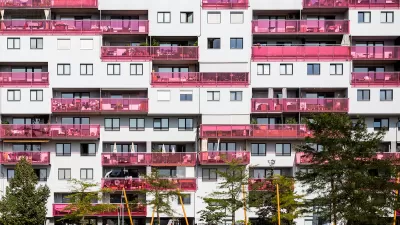The tax on property sales above $5 million has brought in less revenue last year than experts projected, but the measure could still become a significant contributor to affordable housing funds.

A so-called ‘mansion tax’ in Los Angeles that taxes land transactions over $5 million to raise funds for affordable housing and other housing programs has brought in less revenue than expected, reports Sarah Holder in Bloomberg CityLab.
According to Holder, Measure ULA has brought in just $142 million, short of the $900 million in annual projected revenue. “As the housing market stabilizes, the real estate industry adapts, and various lawsuits move through the appeals process, advocates say the tax will prove its worth. By November, monthly sales over $5 million had nearly tripled since cratering in April, bringing in nearly $14 million for Measure ULA.”
Holder notes that “Although single-family homes represent the largest share of its projected revenue at 38%, the tax also applies to most multifamily developments, office buildings and hotels.” Some developers say this will hamstring the construction of multifamily apartment buildings, including affordable housing. “A 2022 UCLA study somewhat assuaged concerns about affordable housing, suggesting that the tax would have little impact on multifamily construction, in part because developers rarely sell their properties right after building them.”
Despite the backlash, “Already, 19 affordable housing projects with a total of 1,500 units have applied for a piece of the $56.8 million in Measure ULA funding available. Short-term rental assistance has started going out to tenants and landlords.” And other cities are proposing their own mansion taxes, including Santa Fe, Chicago, and Seattle.
FULL STORY: As ‘Mansion Taxes’ Catch On in US Cities, Los Angeles Offers Lessons

Maui's Vacation Rental Debate Turns Ugly
Verbal attacks, misinformation campaigns and fistfights plague a high-stakes debate to convert thousands of vacation rentals into long-term housing.

Planetizen Federal Action Tracker
A weekly monitor of how Trump’s orders and actions are impacting planners and planning in America.

In Urban Planning, AI Prompting Could be the New Design Thinking
Creativity has long been key to great urban design. What if we see AI as our new creative partner?

King County Supportive Housing Program Offers Hope for Unhoused Residents
The county is taking a ‘Housing First’ approach that prioritizes getting people into housing, then offering wraparound supportive services.

Researchers Use AI to Get Clearer Picture of US Housing
Analysts are using artificial intelligence to supercharge their research by allowing them to comb through data faster. Though these AI tools can be error prone, they save time and housing researchers are optimistic about the future.

Making Shared Micromobility More Inclusive
Cities and shared mobility system operators can do more to include people with disabilities in planning and operations, per a new report.
Urban Design for Planners 1: Software Tools
This six-course series explores essential urban design concepts using open source software and equips planners with the tools they need to participate fully in the urban design process.
Planning for Universal Design
Learn the tools for implementing Universal Design in planning regulations.
planning NEXT
Appalachian Highlands Housing Partners
Mpact (founded as Rail~Volution)
City of Camden Redevelopment Agency
City of Astoria
City of Portland
City of Laramie





























